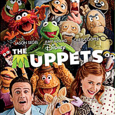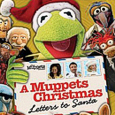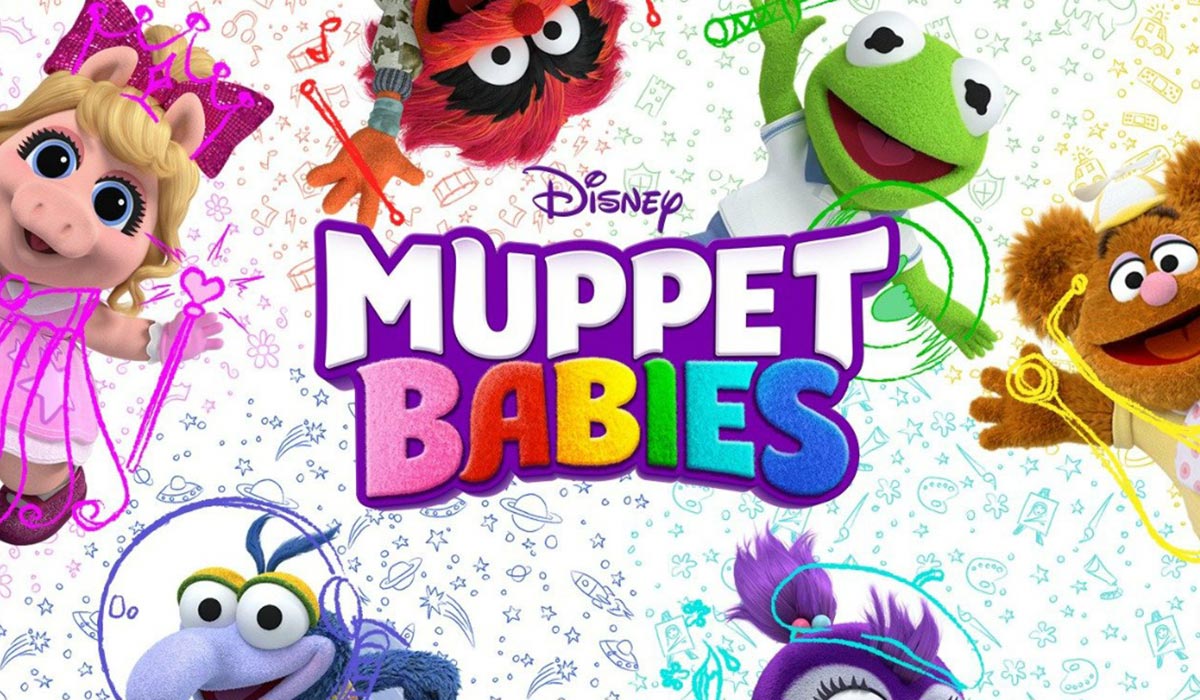Walt Disney Pictures (November 23 2011), Walt Disney Home Entertainment (March 20 2012), single disc Blu-ray plus DVD and Digital Copy disc with Soundtrack Download, 103 mins plus supplements, 1080p high-definition 1.78:1 widescreen, DTS-HD 7.1 Master Audio, Rated PG, Retail: $49.99
Storyboard:
Kermit, Miss Piggy, Fozzie, Gonzo, Camilla, Scooter, Dr Teeth, Rowlf, Bunsen and Beaker…the whole gang is back together for a simply triumphant return to both the silver screen and their rightful place in the status quo of showbiz!
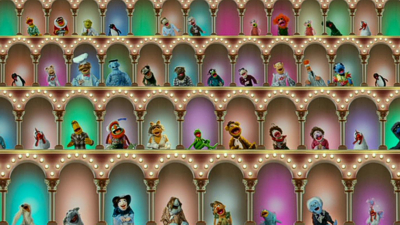
The Sweatbox Review:
Shhh! Don’t tell anyone, but the famed Muppet Theater isn’t actually, as this movie suggests, to be found in almost the exact same location as Disney’s own El Capitan movie house in Los Angeles. In fact, it’s not in LA or even New York at all. Nope, the original Muppet Show is, in fact, a very British institution, and one that might have never happened if it were not for the UK’s famous theatrical and television impresario (first Sir, then Lord) Lew Grade. The young Jim Henson had made an early mark as a regular returning act on The Ed Sullivan Show, where his combination of man and puppet first got his Muppets noticed.
Other work followed – most famously providing existing and new characters to co-populate the pre-school friendly community of Sesame Street – as well as another regular gig on the first season of Saturday Night Live, although this time the characters and situations went very much in the other direction to be very adult in nature (and you thought Meet The Feebles or Avenue Q got there first or were in any way original?). SNL proved to be an uncomfortable fit for Jim and his company, although he could see the value in a puppet show that wasn’t aimed entirely at kids.
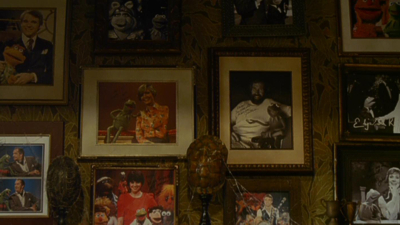
Shopping around a concept for a variety program featuring a regular troupe of players, every one of the major (and not so major) US networks passed, before the internationally-savvy Grade saw a chance to try something new. Grade, who had begun as a variety circuit agent and then built up his ATV business as a very successful enterprise, exporting such shows as Danger Man, The Saint, The Prisoner and many more in US-styled syndicated packages, liked Henson’s pitch, the pair became great friends, and he essentially bankrolled Henson’s projects for the next several years.
There was, however, one stipulation if Grade was to greenlight what would become The Muppet Show, where the weekly variety format would also allow Grade to call in some favors and use his old agency contacts to supply a special guest star for each episode (at first, what was seen as “a quirky puppet show” struggled to find celebrities; by the end of the run, being lampooned on The Muppet Show meant you had really made it!). The show would have to be made in England, specifically at the ATV Elstree Studios Grade owned and operated from just north of London, in Borehamwood, which just happens to be where yours truly grew up after we moved to the UK. Even better than that: my Dad got a job at the Studios, quickly becoming an associate to Jim and meaning that my younger sister and I got to spend our weekends with Kermit and Co!
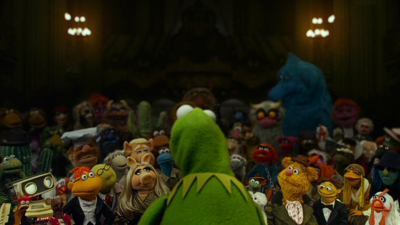
These were truly special, magical times. My love of all things Disney knows no bounds, but whereas that was always based around the admiration for one man and the many things his creativity touched, and has since become more of an appreciation of a more select portion of his company’s more recent legacy, my love for the Muppets is even more pure and distilled, simply because, although there’s still the admiration for one man and his incredible achievements, that legacy is that much more concise and, literally, so much closer to home.
Spending time on the stages where The Muppet Show was made, walking past the huge theatrical “flats” that made up the set of the show’s opening title sequence, visiting the Muppet Workshop and playing around in the many drawers and cupboards, finding all kinds of assortments of eyes, props, tongues, fur and other material…it was absolutely fantastic, although we were clearly spoiled since it just seemed like everyday life for us. To us, the Muppets were real. When we saw them on television in the evening, it was like watching friends, and we would often see scenes that we would have seen being shot just weeks before.
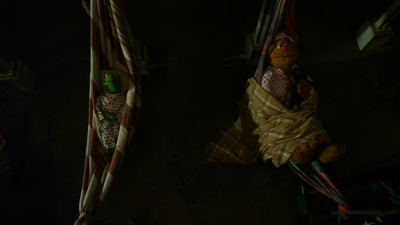
I wanted to be a Muppeteer! After I had spoken to Jim about how the Muppets were operated – and remember, I was probably around seven or eight at the time – he gave me an original Kermit and a pair of the specially made Muppeteer arm operating rods – to try out with. As well as watching the Disney classics constantly, it was going out with this Muppet and making my own Super 8mm films that really gave me the filmmaking bug. Instinctively, I knew how to frame things so that my arms wouldn’t be in frame and that my Kermit would be as alive as he was at the end of Jim’s arm in the Studio and on TV at home (unfortunately, it was also a case of easy come, easy go…I did everything with that Frog from stunts to dipping in sea water, and he’s sadly now just a half-patched up mush of green felt).
The Muppets and the crew were much like a family, and certainly they felt like a part of an extended family so much so that on one night’s episode, my sister was in buckets of tears. Expecting me to have been teasing her (not that I ever did that, you understand!), my mother began to chastise me before I pleaded my innocence. So she asked why my sister was crying, to which I had no answer. Realizing it was because of something we were watching on TV, she asked me what was happening on The Muppet Show that week. It turned out that The Great Gonzo, finally sick of being the weird whatever one, was finally going to fulfil his dream of becoming a movie star, and had announced he was leaving for Bollywood! My sister, as a result, was extremely emotional about this: she had just seen Gonzo a few days before in the Studio and was young enough not to comprehend the differences between the set and the TV. To her, she was losing a friend.
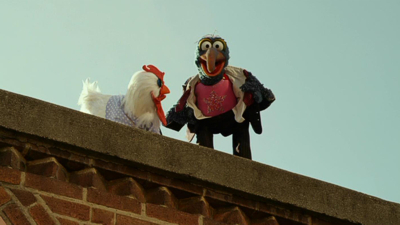
As with many popular shows of the day, a movie spin-off was almost a done deal, and sadly Dad missed out on The Muppet Movie since it was shot on location across America. But he remained with the Henson team, moving almost literally across the street from ATV to the world famous Elstree Film Studios with Frank Oz’s splinter Muppet crew, to work with them on developing Yoda for George Lucas’ Star Wars sequel The Empire Strikes Back. Here again I was able to go down and visit the set, having Frank, as Yoda, saying hi to me, and embarrassingly slipping on the ice of Hoth just as none other than Luke Skywalker came around the corner.
Dad stuck with the Henson team at Elstree after The Muppet Show ended, joining their next project, The Great Muppet Caper, where I witnessed the Hey A Movie! opening musical number (and my sister held up a take in the ballroom supper club because she was hungry!) and we went on location to see Gonzo jump in front of Beauregard’s cab (oh, how that scene wouldn’t be allowed today!) and the exterior of the Happiness Hotel. Since I was still only around eight or nine, I still wasn’t able to be a Muppeteer, but Dad stayed with the Henson crew all through The Dark Crystal, DreamChild and Labyrinth, before the Elstree Studio was eventually shut down for a while after Indiana Jones And The Last Crusade (although it reopened in the mid 1990s and has been busy again ever since).
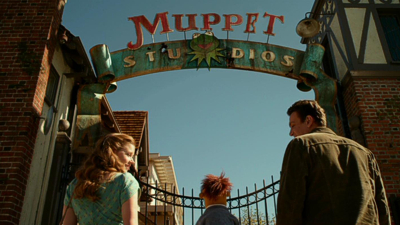
Even though we didn’t have the personal connection with them that we once did, I continued to watch, follow and collect the Muppets. Of course I saw their third movie The Muppets Take Manhattan, and was actually very pleased when Jim entered into discussions with Disney to take ownership of the characters (the initial result of which was the excellent Muppet Vision 3D presentation at the Disney Parks). Without any really major distribution deal, the Muppets and Henson projects were always somewhat out on an independent limb, especially when some costly bets on other projects meant Grade’s ATV and the eventual expansion of that, ITC, went under. The Muppets’ rights were thrown into turmoil, and the situation worsened when Jim prematurely died of pneumonia in 1990. Naturally, I was devastated.
Jim’s son and daughter, Brian and Lisa, inherited control of The Jim Henson Company, with Brian shepherding creatively and Lisa taking care of business. Although the Disney deal was a pet project of the then big cheese Michael Eisner, who had worked with Henson at ABC in the 1950s, negotiations fell apart, though not until after two projects saw fruition: the much loved The Muppets Christmas Carol and the less loved Muppet Treasure Island. This was, where even the biggest fans have to start to admit no matter how much it hurts, where the faint smell of rot began to set in, and a sale to German company EMTV yielded nothing in generating any further interest around the characters, although the Muppet Show styled Muppets Tonight did a more than creditable job of bringing back the variety format, even if Jar Jar Binks was the host instead of Kermit and the single season series is cruelly overlooked when it got more right than it did wrong and was, in fact, mostly classic stuff.
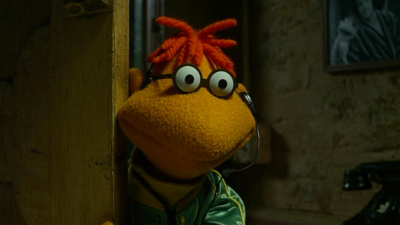
Lisa Henson, then heading up Columbia/Tri-Star, set up a new movie at the Studio: Muppets From Space, a title that promised much but ultimately delivered little, even if fans could spot some bright sparks. For me, however, the Muppets had changed and moved away from their roots: even the material they were made from was glossier, shinier and actually strangely “fake” looking, more like the toys that were sold on their likenesses rather than the Kermit and Co I had grown up with. Not to mention that the biggest problem I had with the film – which admittedly did feature some very amusing and heartfelt moments – was that they defined Gonzo as an “alien”, when we’ve known all along that he’s really “a whatever”. Never mind, it was only a movie I tell myself, so it wasn’t really real.
A return to television followed, with several “event” movies made for the small screen that kept trying to capture the original magic by returning to the Muppet Theater setting. Again, although there were sparks of the old magic in evidence, it was really down to the classic performers bringing those sparks to the party, although even here they were thinning out what with Richard Hunt’s sudden passing and the departure of Frank Oz who, it must be fairly said, was still an executive producer and vocalist even though he had a directorial career, with Little Shop Of Horrors among his credits. Of the new cast, I could never quite get to grips with Eric Jacobson’s lighter and not as rounded Fozzie, while the writing and direction became more lacklustre.
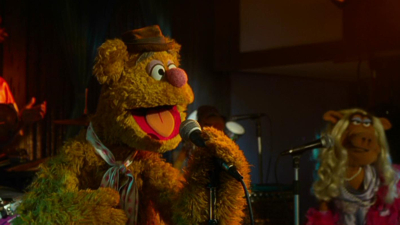
Even though I still loved the Muppets and would never miss anything that featured them (at this point, their biggest exposure was through musical album compilations and parodies such as Unpigged), the gang was at an all-time low, and it was inevitable that Disney would take advantage to table another offer which, this time was accepted. Unfortunately, although Eisner had really wanted to give the Muppets a safe home, the rest of his team didn’t really know what to do with them! And so a long and slow decline began, wherein the Muppet crew was unofficially left to get on to their own devices, mostly concentrating on posting Muppet Show styled clips online (the eventual best of which was undoubtedly their internet award-winning take on Queen’s Bohemian Rhapsody).
The Muppets’ Wizard Of Oz was a last ditch attempt to produce a Muppets event on TV, but again the old magic was dampened. I watched the movie, and I bought the DVD, but what made the Muppets the Muppets was sorely lacking. By the time of The Muppets: Letters To Santa a couple of years ago – a special that, combining “the Muppets” and “Christmas” should have automatically guaranteed a home run based on their previous form – it hurt bitterly when, in my review for this site, I had to concede that “the old Muppets magic has finally and sadly faded, I’m very sorry to write”. True, I got a lot of flack for that viewpoint, but if anyone was a truly genuine, old-school Muppets fan, then they would have seen I wasn’t just talking nonsense.
It was time for some new blood.
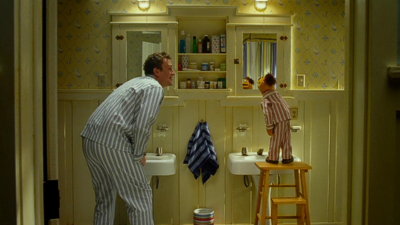
With their acquisition in danger of becoming a huge white elephant, Disney began to look at what they could do with the frogs and bears and chickens and things that they owned. Various ideas floated around, all of them essentially focusing on putting Kermit and company back into the spotlight by way of a new movie. The Next Muppet Movie was a recurring title among the multiple scripts that did the rounds. I even came up with something myself, but reasoned that the classic story parody had now been done to death. It was rumored that Disney had approached Jim Henson’s literal right hand man Frank Oz to return to the franchise, his own directorial career having faltered with the confused but actually quite fun Stepford Wives remake.
And, then, enter Jason Segel. A sometime member of the Apatow company of players, I hadn’t really seen much of his work (I don’t particularly find those films offensive, they just don’t really do much for me) other than his teaming with Paul Rudd in I Love You, Man, a typically raucous comedy on the outside but surprisingly sweet on the inside. With those films continuingly doing well in terms of audience reaction, Segel was part of a group that found themselves in demand as the next big things (Rudd, already a popular face on TV, went on to feature in the filthy but hilarious Role Models) and where everyone was waiting to work with them. Segel’s response? He wanted to work with the Muppets.
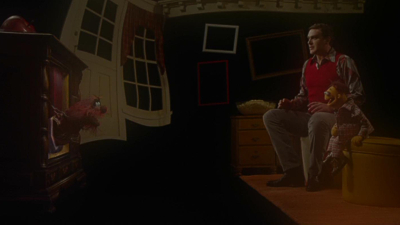
A long-time Muppet fan, Segel was as concerned as many of us as to the future of the characters, and saw a chance to use his career to bring them back to the fore. Much was said in the press about Disney not really wanting to be in the Muppets business but wanting to be in the Jason Segel business, but from the outset I truly believed his intensions were pure. The initial photo still that accompanied the press release announcing his involvement immediately evoked the Muppets of old, particularly I felt, the chaotic sleeve design of The Muppet Show Albums and some of the set-ups in The Muppet Show Annuals of their heyday. The main power behind the project, Segel then called in favors from several cast and crew members he had worked with or known about previously.
Arguably, the original Muppet Show was also a product of its time and place: 1970s England, where Peter Sellers, Spike Milligan and Harry Secombe’s The Goon Show was a distant but still prevailing influence on British comedy of the time. Such shows as Monty Python’s Flying Circus and The Goodies had continued along those same lines, with double-act Morecambe & Wise bringing the same kind of variety show aspect to the format. Remember that it was these programs that the writers and crew of The Muppet Show were watching at the time and, coupled with the additional old English Music Hall songs that peppered the show, it was clearly a melding of British and American culture that shaped it not only into what it would become, but also probably the very reason it was such an international success.
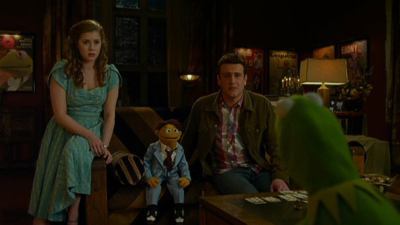
Thus it was an exceptionally brilliant idea to bring in a modern day British influence onto the film, in the form of director James Bobin, known for helming episodes of one of the most talked about comedy programs of recent times, Flight Of The Conchords. I feel awful saying it, but somehow I’ve managed to never have seen the show, something that I feel I should rectify soon, especially after seeing snippets of some of the very amusing song sequences written by co-creator and composer Bret McKenzie. McKenzie also came aboard to write the songs for Segel’s movie, which at one point was rumored to have been intended to be directed by Oz, before he left the project apparently unhappy with the script direction (long-time Henson producer Martin Baker remains credited as executive producer, along with Segel and co-writer Nicholas Stoller).
This then set the fans’ tongues a-waggin’. Just what was Segel doing with the beloved Muppet characters? Was Disney fully aware of the genuine fanbase awaiting the grand return of its favorite characters, and how that fanbase would react if the results were not what was expected? Was Segel more interested in inserting himself in a Muppets movie than doing the characters real justice? Just why were certain members of the old Muppet guard speaking out, often against the movie’s chances? And just who did these people think they were, coming into the Muppet family, shaking things up and having the audacity to think they could name their film The Greatest Muppet Movie Ever Made!?
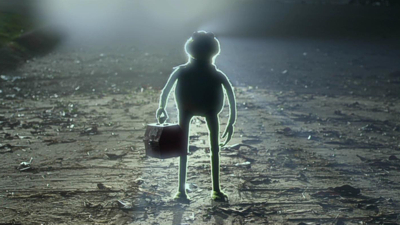
Well, in short: these guys were fans too. Big ones. Fans that pretty much were not only of the original generation that grew up watching The Muppet Show on television, but that had entered the comedy profession as a result and really wanted to see their childhood heroes back at the forefront of family entertainment where they belonged. While some were sniping from the back, I read what these guys had to say in promotional interviews leading up to the film’s release, and I was pleased to be hearing the right kinds of sounds. They had a genuine respect for the characters, and clear ambitions for their movie: the goal, simply, was to get the Muppets back in the spotlight.
I couldn’t believe some of the negativity from some quarters. Anyone that was a “true” fan would have recognized the need for a fresh angle, and if they just calmed down and listened, they would have heard that Segel and Bobin’s take was surprisingly, but absolutely fittingly, humble. Yes, Disney obviously wasn’t sure how to market the film, which had a title change to the bland but reboot-friendly The Muppets, which criticisers leapt on because they reasoned that this wasn’t going to be the greatest Muppet movie ever made after all, just as they knew all along! And yet, I still held faith, and slowly things seemed to turn around: a terrific rom-com teaser began a series of amusing internet spoof trailers topped off with a final preview that – to the real fan that knew what to be looking for – promised much.
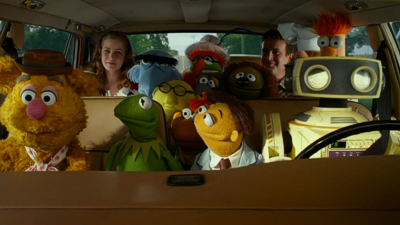
Much scorn was placed on Disney’s choosing to highlight a gag involving Fozzie Bear and his home-made “fart shoes”, with many suggesting Jim wouldn’t have ever sunk so low. It wasn’t Disney’s best choice, but in this age were a wind gag can mean automatic laughs and dollars at the box-office, one can understand them making reference to it. Besides, they’re not actual fart shoes: they’re two whoopee cushions taped to Fozzie’s feet, and as surely any Henson fans knows, the mighty whoopee cushion has always been one of Fozzie’s favorite props: remember back to The Great Muppet Caper and the “weapon” Fozzie packs into the Muppets’ arsenal when they’re about to take on Charles Grodin’s gang! And, anyway, in The Muppets, it’s a funny gag, here and gone within seconds, booed off by the other characters as a succinct and exact poke at that kind of “humor”. Later in the film, where the characters are at a low point, the shoes also provide a genius moment of lightness just when it’s really needed. Fart shoes are, in The Muppets, not only totally in keeping, but fun-eee!
Eventually it came time to actually see the thing, and for old times’ sake we all went as a family (the lady at the movie theater counter was bemused when I asked for six tickets to The Muppets. “How many adults, how many kids”, she asked. “All adults”, I was very happy to report!). We sat, eager to see the results, and probably as nervous for wanting them to get it right as Disney was in what the potential box-office figures were going to be. The first theatrical Muppet film in over ten years, this was widely seen as a last-shot gamble, and one that could easily slip either way. Would audiences care about almost forgotten characters perceived by many to be past their sell-by date? With so many other recent franchise resurrections (Superman, Indiana Jones…) failing to live up to the hype and hopes, I sat and watched.
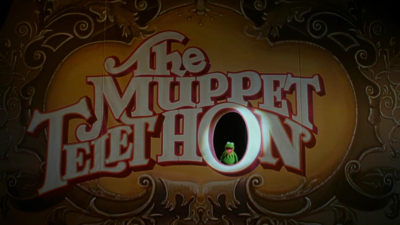
Fundamentally, having now already seen The Muppets more times than I can count on one hand (three times theatrically, at least that via this Blu-ray set), the bottom line is that no-one should have bothered to worry. If nothing else, The Muppets is a clear cut above any other family entertainment I have seen in recent years, but moreover it’s a film made by the fans for the fans, specifically those ones that grew up like Segel, Stoller, McKenzie and Bobin, watching The Muppet Show air on television in the 1970s. Amazingly, it also works for newbies too: in the second showing I saw in a movie house, I witnessed a father and his young son, who can only have been aged six or so, just really getting involved with the movie and having a great time; when Kermit appeared onscreen, the boy gasped as if he’d seen his hero come to life for real, right there in front of him. That’s the magic of the Muppets, and The Muppets has that real magic.
The story is super-simple but as elaborate a framework as it needs to be to achieve its aim: to get the Muppets back together. This is done by initially focusing the movie on human Gary (Segel) and his strangely Muppet-like brother Walter (it’s never explained, it just works), the world’s biggest Muppet fan. Excited by his upcoming trip to LA with Gary and his girlfriend Mary (the always wonderful Amy Adams), Walter can’t wait to visit the famed Muppet Studios (actually the El Capitan mixed with the real Jim Henson Studios compound, which was originally Charlie Chaplin’s studio home) and meet his heroes. When they arrive, they find the place a deserted ghost town, with a sleazy host selling tickets to a low-rent “tour”.
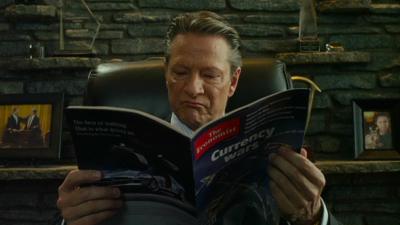
Walter steals away from the group, finding himself hiding from potential new owner Tex Richman, who he overhears outlining his plan to tear down the Theater in order to reach the guaranteed oil running underneath. Hearing the only way to stop this happening is for the Muppets to raise the $10 million to secure the Theater back, Walter makes for Kermit the Frog’s pad (a Hollywood mansion, not the lily kind) to get the gang back together. But what he finds is a Frog whose green is grey because the Muppets are – horror of horrors – no more, having gone their separate ways after finding themselves faded from the spotlight. Naturally, things can’t remain in this state for long, and Kermit agrees to attempt to find his friends, put on a show and, hopefully, save the future of the Muppets!
Right from the opening – where the correct Muppets logo is used instead of the slightly scary “headless Kermit” poster treatment – the sheer nostalgic feel of Super 8mm footage had me smiling – and I didn’t let up for the entire length of the movie. The movie is very cleverly almost autobiographical, and sports the notion that “if you can’t beat ’em, join ’em” in proposing that the Muppets are now not what they once were. This frank, very real approach could be quite the shocker (and, perhaps, many of the old crew took a stance against the project)…if it weren’t one hundred per cent true. The Muppets are not the powerhouse of entertainment they once were; they have, as one network executive in the movie attests, become irrelevant, and forgotten in a world of ugly, abusive “comedy” programs such as the vile pile of crud shown to the gang (an easy target to hit, but one the movie does so perfectly).
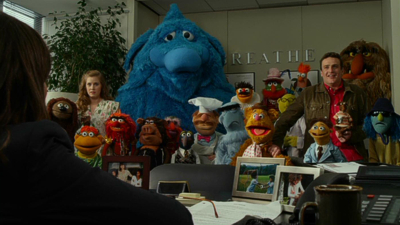
So the stage is set for the Muppets to not only get back together and win over the masses in the movie, but for the movie to win over the masses for real! It’s a lovely concept, one that could only ever work for the Muppets because of the way the characters are presented as real in our world and their continuous fourth-wall breaking (despite the situations, everyone involved is clearly aware they’re in “a movie”). And, in going this route, Segel and his collaborators simultaneously address the reason as to why the Muppets aren’t as popular as they were, provide a chance for them to get back to their roots and entertain once more, and prove that audiences have needed them all this time, all while making sure everything is so in place that even the negative fans should find themselves quietened down.
So okay, maybe this isn’t The Greatest Muppet Movie Ever Made in terms of guest stars or cameos…but I beg to differ! The film’s human lead is already a popular face on television (How I Met Your Mother) and a rising star in the movies: his next film due for release this summer will no doubt send him stratospheric. Next to him we have none other than three-time Oscar nominee Adams, who has already done the up-and-coming route and made her mark in everything from award-worthy dramas to big-hit family entertainments such as Enchanted and Night At The Museum 2 and will next be seen as Lois Lane in the next Superman movie – these are not obscure nobodies!
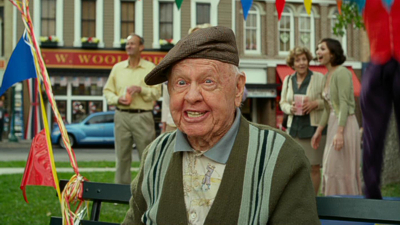
As the bad guy, Chris Cooper may night be a name that trips off the tongue so quickly, but he’s a heavy hitter too, having won an Oscar for American Beauty, and his presence is somewhat like having Gene Hackman playing Lex Luthor in the first Superman: because he’s usually always cast as a serious, slightly creepy or unpleasant character, he not only lends The Muppets a dramatic weight, but we can also believe him as a villain. This is a man who will do bad things, even if Cooper is clearly having a ball playing against type in a comedy musical movie, making his eventual, unique “song” and final breakdown moment that much more surprising.
When it comes to the cameos, I agree that things are a little more lightweight, and obviously as much as Segel and co tried, even they couldn’t convince some people that it would be worth their time fooling around in a new Muppets movie. We get some previously bigger names (Whoopi Goldberg, always a Muppet supporter; the movie’s choreographer’s dad Mickey Rooney – always happy to be on hand when someone needs to put on a show – previous Muppet Show guest Alan Arkin, and some spot-or-miss-’em faces including Judd Hirsch) and even some that are still fresh (Neil Patrick Harris, Sarah Silverman, Dave Grohl – as a fake “Animool”), plus a couple of embarrassing “for the kids” faces (such as Selena Gomez, not really knowing what even she is doing here). Even then, how could any movie match the phenomenal line up that graced the original The Muppet Movie, a film made in their absolute heyday when folks were falling over themselves to make an appearance?

But even so, the likes of Segel’s Gulliver’s Travels co-stars Emily Blunt (essentially reprising her The Devil Wears Prada role), current comedy star Zach Galifianakis and, especially, Jack Black, can’t be described as either wannabes or has-beens. Okay, so Gulliver’s was too confused to be a smash hit for Black, but he’s still a massive audience draw, a big deal in modern Hollywood, a heck of a catch for this particular movie – and a great sport for saying yes and putting up with whatever the Muppets throw his way! What’s great is that all these guys’ obviously saw something in the script that made them believe it could work, and that’s the feeling that spilled out into the audiences that rewarded all the hard work, and worrying, and made The Muppets a genuine hit, proving that the world is ready for them to entertain us again, just like they did way back then. We even get a self-referential Muppet cameo: Sweetums, the lovable monster Muppet, who again gets left behind at the Mad Man Mooney (and Son!) used cars lot!
With everything said so far you’d be thinking this was the most amazing film I’d ever seen. So is it, for me, a perfect movie? No, but then what movie could ever be? And even so it’s about as perfect as it could be. If we’re really going to be picky, it did bother me that there was a bit of confusion over what the Muppet Studios were: was it the original Muppet Theater (and therefore much more known as The Muppet Theater), or was this another place that incorporated the Theater, as did seem to be the case going by a briefly seen Disneyland-styled map? Likewise, as much as I adored Mary’s introduction (randomly showing school-kids how to fix an old British Morris Minor car), I would have loved for the road-trip element of the movie to have taken place in that old car: something much more quirky and fitting for the Muppets than the deluxe limo that they eventually use.
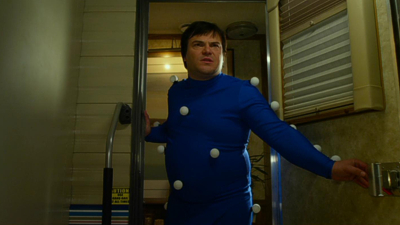
I also thought the villain’s plot point of wanting to raze the Theater to the ground was just plain silly, even for a Muppet movie! How could there really be oil under the land? In the middle of a LA’s busy Hollywood Boulevard, wouldn’t it have been found before or be quite easily as mined from a few storefronts down the street? I know Richman (so cool to see him plotting with the otherwise forgotten Uncle Deadly!) has his own reasons for wiping out the Muppets (nicely referencing the Standard Rich And Famous Contract that Kermit signed with Orson Wells – a nice reference to their past as Lew Lord), but going by his penchant for singing showgirls, I wonder if turning the Muppet Theater into an opulently vulgar gambling joint might not have been a better scenario – and probably more against the Muppets’ morals and values? Same result, more believable reasons.
Likewise, I thought we would get much more of a story interplay between the Muppet gang and the awful rip-off/“tribute” act The Moopets, who seem to be set up for more than they ultimately get to pay off with. It’s with their introduction that we meet Fozzie Bear, now a subordinate in his own band, and now performed by Jacobson. Although he can get Piggy spot-on, I’ve been quite critical of Jacobson’s Fozzie vocals before, where I have found he doesn’t quite reach Oz’s harder-edged voice, but here he either seems to be making special effort or has simply settled down into the role a little more. Still, there’s one line in the movie – fans will immediately spot which one – where he sounds absolutely nothing like Fozzie and almost more like Walter. Why no-one noticed this or anyone suggested they just re-record this line, or even why Fozzie’s vocals are not pitched down just a touch is a mystery: Jacobson gets the intonation if not the pitch, and of the new voices, Fozzie’s is the one that just doesn’t always ring true, even if he nails it for the “Muppet Man” scam.
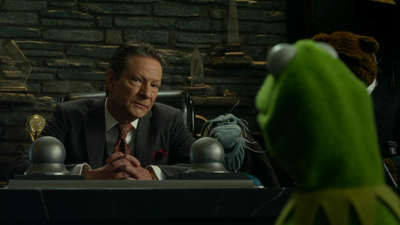
Another moment that I anticipated would be stronger is when the Muppets return to their Theater for the first time in years. Kermit rips away the condemned tape, and the Theater, although dusty and in ruins, still holds the old magic, the echoes of Jim’s Kermit and intros to Veterinarian’s Hospital and Pigs In Space floating in the air. But the Theater is a mess! Walter evokes the Muppets’ spirit, suggesting that they clean the place up with a song. Even as he spoke, I was ready for another of McKenzie’s strangely spot-on Muppets tunes that he seems to have written in the classic Paul Williams style. Expecting something along the lines of Dr Teeth And The Electric Mayhem’s Can You Picture That, it’s almost a crushing blow when Dr Teeth himself simply presses play on his old tape-based music system, and We Built This City comes blaring out (just one 1980s reference that I wasn’t sure I got, when the Muppets’ original heyday was a decade earlier). This is perhaps for me the film’s biggest missed opportunity, making the point that, “You’re the Muppets! You do this to music!”, and then not letting the Muppets take the lead with that.
If I’m going to be honest and pick-apart some of the more minor things that might have been covered better, I’d have to say that I was disappointed into the blatant advertising for Pixar’s Cars 2 on billboards surrounding the Muppet Theater on Hollywood Boulevard (I don’t know why, but I always imagined the Theater to be New York based anyway; a kind of run-down shack off-off-off Broadway). I know that some of the Muppet-mad Pixar crew supported the production, and maybe this was a way of saying thanks, but with the design team going as far as replacing the El Capitan lettering on the front of the building, then surely the Cars 2 hoarding could have been switched to a Muppets Telethon poster? At both times it’s glimpsed in the film it’s so large in frame that it can’t go unnoticed, and I’d have personally appreciated some Muppets items adorning the Disney Store at the front of the theater as well: it just seems so out of place to be catching Winnie The Pooh merchandise so prominently in the window.
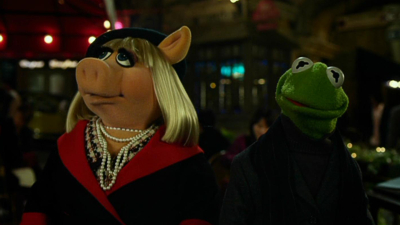
But these are teeny, perfection-seeking elements: the rest of the movie gets things so right that this could only ever be the work of genuine fans. What immediately struck me was that the very look of the Muppets harkens back to the original Henson Shows. Even during the original trilogy of Muppet movies, the feel of the characters changed somewhat, as the mechanics became more streamlined. Not that they really looked much different, but hard-core aficionados would be able to notice the difference between a Muppet Show Kermit, Fozzie or Piggy (even between seasons) and the early and later Movie Kermit, Fozzie and Piggy – but what’s great here is that it is either a conscious (I hope so) decision or not, and the gang has returned to their classic later Muppet Show season look and feel (these are very subtle things, but they mean a lot to the right people)!
The opening number, Life’s A Happy Song is just the first of a series of memorable tunes that I couldn’t get out of my head for days (and still keep breaking into). The Smalltown setting for the song may look familiar to fans of Back To The Future, but it’s the staging and lyrics that make it a classic (“Life’s a fillet of fish, hey!” is one such random line that has a payoff that cracks me up every time), and Segel’s willingness to throw himself right into the routines with abandon immediately shows his heart is in this for real. With a reprise of the song as a finale, if there’s one thing the movie doesn’t know how to do, it’s how to end: there are around three or four “out points”, but you know what? It doesn’t matter, since this is such a celebration of the Muppets that one can not only happily partake in the indulgence but actually wallow in it!
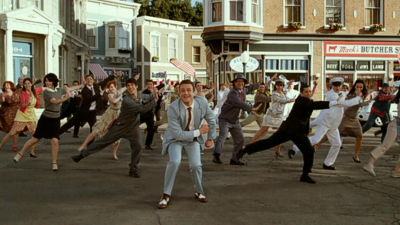
If anything, I personally would have liked to have seen more respect paid to Jim Henson by Disney itself, which seems eager to claim the Muppets as their “property” in the closing credits (true enough, but would it have hurt to include a “Muppets created by Jim Henson” line?), but the filmmakers do manage to fit in some nice touches: a banner outside the Muppet Theater celebrates Jim, as does a very nicely placed photograph on Kermit’s office wall, a tribute which brought a lump to my throat. Bringing even more emotion is Kermit’s musical soliloquy Pictures In My Head, a heart-rendering stroll down memory lane that has me in tears. All of that feeling for the Muppets, for Jim: everything that they were, and are, and my personal connection to them is rolled up in that number, and like Saying Goodbye in The Muppets Take Manhattan, it will continue to get me every time without fail.
The sequence takes place at Kermit’s Hollywood home, and here was another element that some fans reacted negatively towards, as if Kermit had abandoned his friends and was living the high life. Yes, that would have been out of character for Mr The Frog, but nothing could be further from the truth: here Kermit has become introspective, not cut off from reality but being almost trapped in the Xanadu-like environment Miss Piggy built for themselves in a happier era. He’s still the Kermit we love, but far from living it up, he’s surrounded himself with images of the past, becoming something of a lonely recluse figure remembering old times. In a way, as much as Walter needs him, Kermit needs Walter to shake him out of this funk, although it’s lovely that it is his Muppet friends that help, coming to life brilliantly through their portrait paintings (another nod to the Muppets’ past, the frames reminded me of the portraits that would adorn pages of The Muppet Show Annual books).
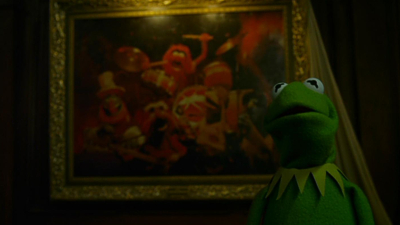
It’s also here that Steve Whitmire confirms he is the only man capable of filling Henson’s shoes, or flippers if you will, as Kermit and his menagerie of characters (when Kermit sings “Would anybody watch or even care?” I so wanted to shout back “Yes, we care! And we’ll watch!”). He must surely have had a tough time taking over from the boss for The Muppet Christmas Carol in 1992 so soon after Jim’s passing, but arguably the stakes and emotions are now even higher: here he has to sound right so as to bring back Kermit’s authentic nature (which he does vocally and through his remarkable movements that brings a real depth), particularly through a range of emotional highs and lows, and especially during a re-recording of a signature tune, Rainbow Connection. I would imagine Bein’ Green will remain sacrosanct as only Jim could ever perform it (even if Whitmire has tried), but if there’s another Muppet song that comes close, then it’s Rainbow Connection.
I can’t begin to imagine the emotion that might have been running through Whitmire as he took to the mic to lay down those vocals. He does an admirable and very fine job, of which I am sure Jim would be pleased indeed, and the way the rest of the characters hold hands and join in towards the end is pure, classy and classic Muppets all the way. I could have done without the song being split in two to accommodate a cut-away to Floyd and Animal backstage, but at least the song is featured in full on the soundtrack album, and even with the break included in the film, it wasn’t for the first time that the water works flooded out again for me: in this Rainbow Connection moment, during which Piggy looks truly radiant by the way, the current crop of Muppeteers absolutely validate themselves as keepers of the flame, and may it continue to shine for a long, long time.
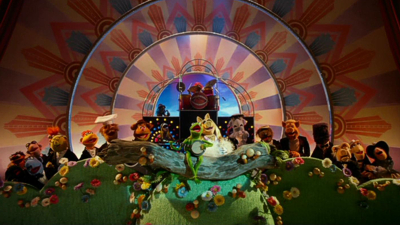
There have obviously been a few changes over the years: nowadays digital technology allows the Muppets to move their arms without the aid of those Muppeteering poles that Jim gave me all those years ago. I’m not sure how it was achieved, but I’m guessing it was through the magic of wire removal CGI, meaning that The Muppets is also a pretty darned nifty visual effects movie too! For the most part the characters’ arms, or, more specifically, their hands, are kept out of frame (if there’s one area where The Muppets scores over any other recent Muppets outing it’s also in Don Burgess’ excellent framing), but whenever we get wider frames, I immediately noticed that the performing rods were nowhere to be seen. Very clever stuff, this instantly gives the Muppets additional natural life, but I do wonder if it also takes away a teeny bit of what makes the Muppeteers and their process special.
But otherwise it’s all business as usual, with some brilliant laugh-out-load gags that will entertain the kids and crack-up the adults (the Swedish Chef’s Scarface line gets me every time; there’s also a very funny Wayne and Wanda gag), and more than its fair share of touching moments, such as Kermit and Piggy’s Parisian tête à tête, which brings up some pretty deep emotional baggage that has to be dealt with. And once the Muppets’ Telethon gets underway, it really is a return to old times, essentially turning into a potted episode of The Muppet Show, with “guest” Jack Black tied and bound (kidnapped most amusingly) and obliged to appear as the celebrity host the network exec (Rashida Jones, another Segel colleague) demands.
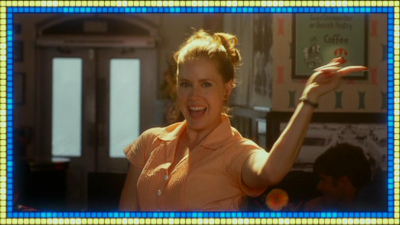
Here the old gags come thick and fast: the faithful recreation of the original The Muppet Show titles may make the hair on the back of some fans’ necks tingle, and there’s the usual reliance on comic skits and musical numbers. Nirvana’s Smells Like Teen Spirit gets a good barbershop quartet poke and continues the Muppets’ covering of music’s most popular tunes, while my absolute favorite pick of the bunch is Camilla and her chicken pals’ take on Bruno Mars’ Forget You (or should that be “Cluck You”?), made a big hit of the past year by Cee Lo Green and possibly serving as an answer to a live appearance he made which mocked up the same staging as when Elton John performed on The Muppet Show.
Earlier in the movie I wasn’t too enamoured with the fairly redundant song Me Party, but I guess when you have someone of Adams’ calibre in a film you need to give them a chance to shine, and at least Piggy shares in the moment. The same could also be said of Richman’s number, in which Cooper raps his character’s mantra: cut shorter in the movie, the full as featured on the soundtrack album song outlines why he hates the Muppets, but in the movie it’s much funnier since it happens so spontaneously and is over in what feels like seconds, pulling off a classic Muppet trick of throwing something completely random into the mix and never explaining it!
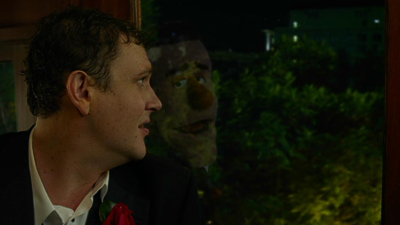
Just as good is the ultimately Academy Award-winning Best Song moment Man Or Muppet – I just love that weeks before The Muppets opened it was already being written off, and then it not only garners the best reviews for any movie of the year as monitored by Rotten Tomatoes, but also a more than respectable box-office gross and an Oscar into the bargain! Man Or Muppet isn’t quite the best song in the movie (that would be Kermit’s Pictures In My Head, for me), but it’s the moment where Segel gets to display all his Muppet love in one concentrated hit (and I would gladly follow and confirm that I’m a Muppet of a man, too, and very proud of it!).
If I could venture forward with a thought, though, it would be that Segel’s own Muppet representation was too close a “recycling” of the cheesy lounge act Johnny Fiama from Muppets Tonight: closer inspection actually reveals the two only bear a passing resemblance, but there is a similarity. It’s actually a funny moment, where both Segel’s Gary and Walter have to decide who they are – are they a man or a Muppet? – with each presented with the alternate version of themselves, but I would suggest another alternative, that they saw each other in their reflections. I think this might have strengthened their bonds further (certainly it would have made the Segel/Walter connection that much more obvious), and taken away the fans’ possible Fiama distraction (I know I wasn’t the only one in our group to join those dots). On the other hand, that would rob us of seeing The Big Bang Theory’s Jim Parsons as the human Walter, a gag that gets one of the movie’s biggest laughs, so I guess it’s good either way.
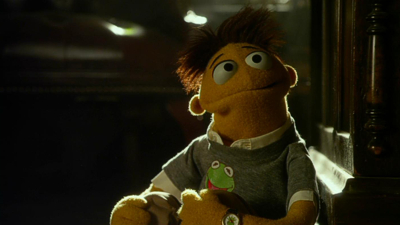
Finally, in Walter himself (named for who, we don’t know: could it be Uncle Walt?), Segel is obviously projecting his own Muppet appreciation onto the character, providing a suitable substitute for his own feelings towards Henson’s gang while also still being able to appear as himself and thus bring an additional audience interest to the film. And Walter is a very perfect new member of the ensemble: almost like one of the Everyman Muppets has got a promotion, with a hysterical “talent”, revealed only right at the end, that means he’ll fit in wonderfully if he is to remain around – and the indication seems to be that he will be. Making him a Muppet mainstay is also a fitting tribute to Segel: his aim was to bring the Muppets back to the fore; with that job done, he is free to move on, but there will forever be a part of him left in the troupe.
As much a sequel to The Muppet Show and the initial Muppet Movies as it is a reboot, The Muppets is inspirational, Muppetational and – above all else – celebrational of a nostalgic era for those of a certain age that also manages to reassert that feeling for a whole new bunch of fans. As much as my generation of friends got the movie right off and enjoyed it immensely, it was terrific to see younger audiences responding in the same way even if for different reasons. The world really does need the Muppets back in a big way, and The Muppets surely paves the way for that to happen. The original The Muppet Movie can never be touched, of course, but in its own way, for what it set out to do and ultimately succeeds in spades, The Muppets could actually well be the greatest Muppet movie ever made!
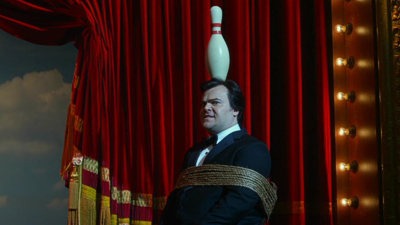
Is This Thing Loaded?
Promising a loaded home video release, The Muppets somewhat fulfils Segel’s word and, even if the supplements ultimately feel a little lightweight, the Wocka Wocka Value Pack under review here – which features the HD Blu-ray, standard definition DVD, Digital Copy file and the movie’s Original Soundtrack as a download option rounds things out nicely with its added bonuses. Across both video discs, Disney’s Sneak Peeks include previews for Brave, Beverly Hills Chihuahua 3, Secret Of The Wings (just how long has that thing been coming!?), Movie Rewards, Disney Channel’s ANT Farm, the mawkish and very odd-looking The Odd Life Of Timothy Green, The AristoCats on Blu-ray, and Pixar’s Planes.
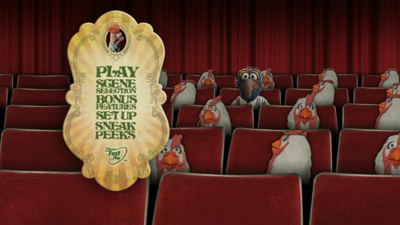
On the Blu-ray Disc, The Muppets’ Main Menu doesn’t disappoint, offering up a very fun breaking of the fourth wall where the characters sit waiting to watch the movie while still getting up to their antics. Here the very pure essence of the characters comes through even when they’re not really doing anything: just wait to see Gonzo’s stare and Animal’s genuinely crazed eyes! The usual options are present and correct, although I’d have much preferred more than the lousy 20 scant chapter stops the movie gets, but nudge right from the Bonus Features choice to highlight a very amusing Easter Egg – that literally cracks when selected! – for a crazed 46 second look at the many permits the movie needed in order to shoot. It’s funny enough, and gives one of the rarely-featured “Anything Muppets”, Jade Green Frackle, a chance to be noticed.
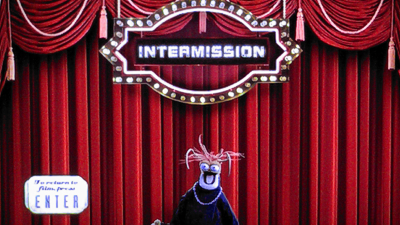
The disc also has some alternate fun up its sleeve in the form of a new Disney Intermission option, which automatically plays, unless deselected, whenever the movie is paused! Featuring a mix of new, menu-specific shot material mixed in cleverly with some of the other bonus features, this is a great idea that’s been implemented very amusingly for the most part. Some of the brief throwaway lines are just that, and it can be a little random as to what you land in terms of anything much happening or not, but Statler and Waldorf’s audio comments are as sharp and curmudgeonly as ever. Pausing the Intermission halts everything for real, while selecting Enter returns us to the movie.
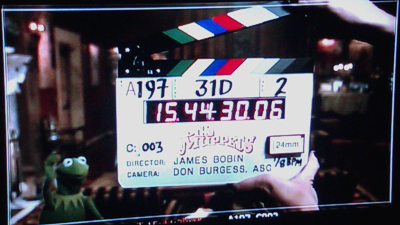
In the Bonus Features proper, head of the list has to be the feature-length Audio Commentary with star Jason Segel, director James Bobin and Nicholas Stoller. I was super-interested to hear what the guys had to say but have to admit to being very disappointed with the resulting track, during which very little of worth is said as the three guys just goof off. I was hoping to hear first hand accounts of their background with the Muppets, how the movie came about and, in particular, how several of the trick shots were achieved, but although Bobin does slip a little information through here and there, speaking at times about deleted moments, it’ll be a frustrating listen for many. One funny early anecdote that is worth catching involves Mickey Rooney being called “Dad”, but I actually learned much more about the production and the filmmakers’ more serious approach to it via pre-release interviews and TV specials, even though the fun they had making the movie and the camaraderie they share is very apparent.
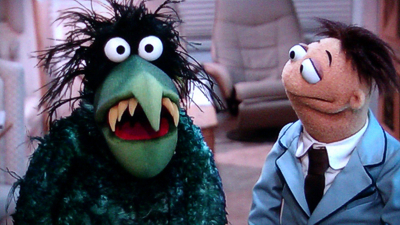
The hilariously named Scratching The Surface: A Hasty Examination Of The Making Of The Muppets bizarrely but brilliant invokes memories of The Hitchhiker’s Guide To The Galaxy, serving up all sorts of facts and figures in a way that combines the audio style of the original BBC series with the graphics of the more recent big screen version. Quite why this has been done is perhaps a British in-joke, but it’s still a typically Muppet-esque approach and sounds as if it’s good old Disney historian Brian Sibley doing the mock narration. Over almost 16 minutes, Jade Green Frackle also hosts, visiting the set and actually showing off quite a bit of behind the scenes material. The characters are treated as real – just as they should be, because they are – and so we don’t see any Muppeteers (interestingly, their arm rods have been digitally removed here too), but we do see a lot of Muppets along with a fun poke at Segel’s many roles on the movie and a crazy “tea-time” moment. Again there isn’t a lot of “real” information, but it’s all very funny and contains at least a couple of classic gags.
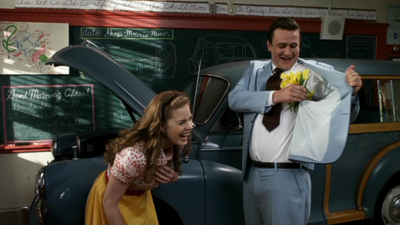
There are also laughs to be found during The Longest Blooper Reel Ever (Well…At Least In Muppet History) *We Think (8:33, also the lone supplement on the enclosed DVD). Like method actors, the Muppet performers resolutely stay in character whenever a line is flubbed by either themselves or their human co-stars, and so half the fun here is in finding everyone cracking up to various adlibs. There are interesting hints at some deleted scenes to be caught, and an extended gag for Hobo Joe that is funnier for the Hobo Muppet reactions rather than from Galifianakis, although the best moment is saved for Segel himself, struggling with a bunch of posies in his jacket.
A Little Screen Test On The Way To The Read-Through (3:18) is a strange little skit that follows Walter, Kermit, Scooter and the rest of the Muppets as they make their way to the film’s first script read. Evidently it seems this is an early test shoot for cinematographer Don Burgess to become familiar with possible ways to make the Muppets look their best on camera, although without any context some viewers may wonder what it’s all about. Perhaps at one point destined as some kind of teaser clip, it ends with a play-through of The Muppet Show theme over some early graphics.
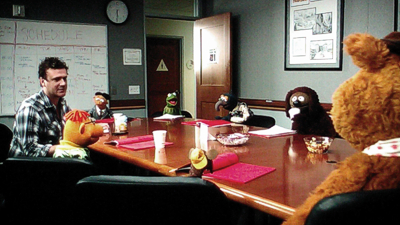
Performed in full on the soundtrack album but trimmed in the movie, Explaining Evil: The Full Tex Richman Song (2:38) presents Chris Cooper’s villain rap complete with an extra verse and Muppet-hating backstory. In truth, while it may work on the soundtrack, the added moments here don’t really work, from a couple of repetitive lyrics to a slight lack of energy. Richman’s reasons may be made clearer, but they don’t add a lot to the character, and ultimately the song, as it plays in the movie, is that much better for being shorter and essentially out of left field in its randomness, therefore actually making it funnier.
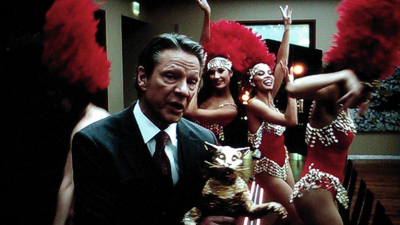
Richman’s song leads us to more Deleted Scenes, some of which are self-explanatory (Walter’s Extended Nightmare) and some of which point to further possible sub-plots that need a little light shed on them. Life’s A Happy Song: The Missing Verse is fairly obvious, though correctly removed since this little addition for Walter would have meant two slow verses in the sequence (coming after Mary’s moment), while A New Hero In Hollywood adds an overwrought and unfunny bit to the trio’s arrival in LA. Credit Card Club brings zip to the party, Muppets In Jail finds the gang locked up pre-show, and only Bowling For Beaker is so absurd it should have been left in.
Much was made about additional cameos that were cut from the movie, but we can be glad that The Strip Mall Awards was left on the cutting room floor: although it explains why the Muppets end up in jail, it saves us from having the hugely overexposed Ricky Gervais stain this classic movie and removes a vastly unfunny Billy Crystal, who is actually upstaged by a supposed look-alike! The Complete Muppets Telethon Opening & More merely plays The Muppet Show theme again, but does add a nice moment where the characters descend from the stage rafters. In all these clips add ten minutes of material, but although it’s mostly nice to see them here, it must be said that all but two of them were rightly removed: part of The Muppets’ magic is how it whizzes through its tightly paced running time.
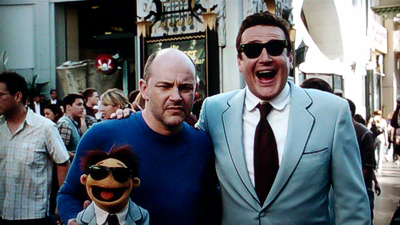
A big part of The Muppets’ awareness-building marketing was based on attracting their faithful internet following audience, and a series of joke previews that made fun of other movies being released in the run-up to the film’s premiere quickly went viral. The brilliant initial romantic comedy-tinged clip Green With Envy, as well as several more (including The Girl With The Dragon Tattoo, Green Lantern and Paranormal Activity pastiches), are here along with a couple of previously unreleased Theatrical Spoof Trailers (Rise Of The Planet Of The Apes), and The Muppets’ own spoof spoof, which all run nine minutes in a Play All option. While there are no full trailers for the movie included, it’s still cool to have these clips together, and the Green With Envy teaser does the job as good as any.
I would have liked more on the actual technical aspects of making The Muppets, though as always it seems the days of the “making of” shows and specials that pop up on television in the run-up to a movie’s release being included in a film’s eventual disc release are long gone. On the other hand, the entire aim of The Muppets is to recreate the authenticity of Kermit and company, and so blowing any behind the scenes secrets could tarnish things in those regards. It’s likely long-time fans will know how certain things are achieved anyway, so better to let the Muppets work their magic and mayhem, and leave a little mystery.
Case Study:
Offered in single disc DVD, Blu-ray/DVD combo or the all-in Wocka Wocka Value Pack, cover art amongst all three is pretty much similar, each sleeve using elements from the theatrical poster but burying Segel and Adams a little more than before, giving the Muppets their rightful dominance. Nicely, the Wocka Wocka pack reviewed here presents an entertaining change to Disney’s usually blue-rimmed BD slipcovers, instead going for a more than suitable green border and having some fun with the info blurb found on its front sticker.
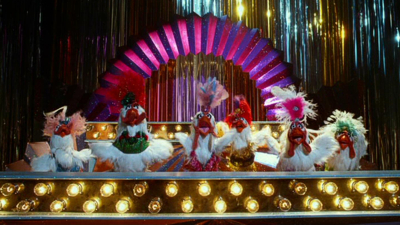
Inside, the double-disc BD case holds the Digital Copy file disc and the regular DVD on one side, sandwiched together, the Blu-ray on the other, and a promo booklet offering up some Muppet games and Disney plugs for other products, including The Muppets CD, which is peculiar because the Wocka Wocka pack gives The Muppets Original Soundtrack (although mystifyingly nowhere on the package does it mention its Oscar-winning song!) away for free via a code-activated download! I know I should have picked up the CD by now, but when I saw this pack was going to include it, I decided to wait patiently.
However, as soon as our copy arrived at Animated Views Towers, my enthusiasm got the better of me and, when I attempted to enter my code before the disc’s street date, I found the webpage wasn’t live yet and I’d squandered my code for nothing! But, thanks to my colleague Dacey here at the site, I was able to enter another code and unlock the offer, meaning I can now listen to squawking chickens clucking away forever more on an insane loop – thanks Dacey! Everyone else should find their codes work fine – it’s a very simple process – as the offer is good until April 1, 2013.
Ink And Paint:
Refreshingly not offered with a 3D option in theaters (that’s still, for now at least, saved for the MuppetVision attraction now at Disneyland), The Muppets proves that good family filmmaking doesn’t need a gimmick to entertain and make money. I guess that the movie was shot digitally, since there are no tell-tale signs of good old fashioned film to be spotted, and it’s as sharp as possible on the Blu-ray disc, where the HD brings out every detail of the Muppets’ fur detail. For anyone spotting some instances of soft shots, all I can say is that I noticed them too in my theatrical viewings, so we must assume that this is inherent in Don Burgess’ cinematography, surprisingly that this is. Elsewhere and for the most part, however, this is a top-notch, solid transfer that does the Muppets proud.
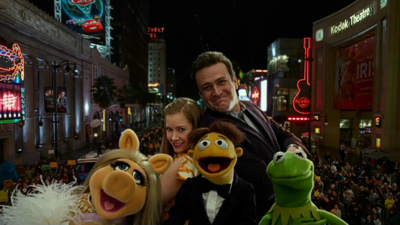
Scratch Tracks:
Just as the image has a few imperfections, some may notice that not all the (human!) performers have mastered the art of miming to their pre-recorded playback tracks. I won’t point anything specific out here, but on more than a couple of occasions I did wonder why a retake wasn’t requested so as to nail a song shot with more synchronicity. Once again, it’s not a case of being a fault with the disc itself, but as a moderately lower budgeted feature, perhaps there just wasn’t the time to go back and marry things up more closely, or maybe someone just didn’t notice. It doesn’t detract from the enjoyment of the movie but given the lengths gone to here it is strange when certain such simple things don’t hit their mark (Chris Cooper notwithstanding). Dubs and subs in 7.1 English and French, Descriptive English 2.0, plus 5.1 Spanish are bundled in.
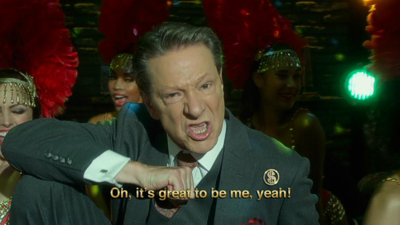
Final Cut:
With The Muppets and The Adventures Of Tintin rounding out 2011 theatrically, it’s good to report that there is still a place for first-class, quality family filmmaking to make its mark against such, frankly, crap as what else is out there passing for the same thing these days. And I thought it was great that Disney awarded this movie in particular their usually reserved prestige animated feature Thanksgiving spot during November, sending out exactly the right kind of signals to more casual moviegoers who no doubt made up a sizable portion of the audience that ultimately made The Muppets the kind of hit that has already generated talk of a sequel and possible return to the small screen to again play the music and light the lights for more of The Muppet Show. Now that would be great, that would be grand!
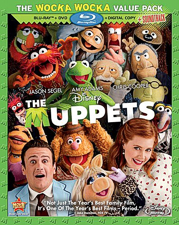 | ||
 |


